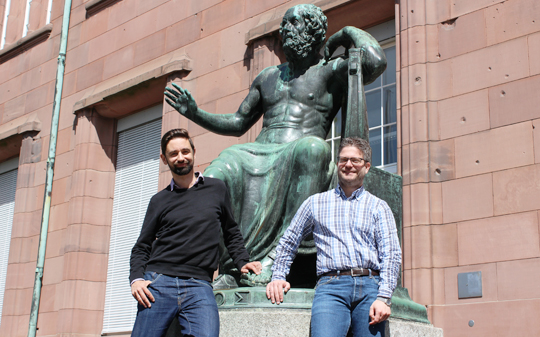Yellow religious critics
Freiburg, Aug 17, 2017
They are yellow, have four fingers on each hand, googly eyes and a ginormous mouth. For more than 25 years the US TV series The Simpsons has parodied culture, society and politics – from the overeager, activist swot Lisa Simpson through the power-hungry business shark Mr. Burns to the Reverend Timothy Lovejoy, who sometimes burns down a church to collect the insurance money. The series is loved by fans, praised by critics, and now even the subject of research: Freiburg theologists Dr. Johannes Heger and Dr. Thomas Jürgasch together with Prof. Dr. Milad Karimi from the Westphalian Wilhelms University have brought out a book that looks at the role religion plays in the Simpsons’ universe. Rimma Gerenstein spoke to the theologists.

On the couch: for 25 years The Simpsons has criticized politics, society and culture – and that makes researchers curious. Photo: Sandra Meyndt
Mr Heger, Mr Jürgasch, normally theologists deal with ancient texts – thousands of years old – and biblical figures. What made you think of researching a TV series?
Johannes Heger: Before I went to university I worked as a teacher in a high school. Everyday business there is less about the study of ‘ancient texts’ and more about rousing the interest of the school pupils for religious themes. This led me to the Simpsons: I always enjoyed watching the series, and it’s full of religious themes which are also dealt with in the ‘ancient texts’. As a whole, religion is a motif that comes up very often in The Simpsons – and does so in many different variations. So, working with Thomas Jürgasch I developed these ideas.
Thomas Jürgasch: It may be unusual for theologists to deal with a TV series, but in the end what we are doing is conservative in its true sense: the fathers of the church ordained that as a serious theologist one should consider the phenomena of one’s own times. If I take this belief as my model today, then I must also tackle postmodern philosophy, history, physics and literary studies – and likewise popular culture.
What picture does The Simpsons draw of religion? For instance, if you think about the Reverend Timothy Lovejoy, he isn’t a priest whose sermons you’d want to listen to.
Jürgasch: The series is generally very satirical about religion. Reverend Lovejoy emerges as a boring guy, and neither Homer or the children want to go to church. Reverend Elijah Hooper, who is the example of a trendy priest, is also equally mocked. He wins over the congregation by constantly quoting serials and films. But in the end it’s clear that it’s worthless in crisis situations. So the way the church ingratiates itself using popular culture is scrutinized satirically. The series also deals with other central questions too, for example how people imagine God. The Simpsons’ makers had an interesting idea here: you never see the face of God directly, only his bushy beard and a white robe.
Heger: One of our key theses is that The Simpsons functions like a mirror for today’s postmodern society and culture. They show religion as it is today in the real world – whether with regard to content or else religious practice. In this reflection you can see not only current changes to religious traditions, but also many instants that show how religion is understood, misunderstood or simply no longer part of life. For us theologists it’s interesting, because The Simpsons put their finger on various things that are wrong, without indicating what a positive alternative might be like.
So is religion in crisis in the yellow universe?
Heger: I think that’s pushing it a bit as a thesis. It’s more, I think, that we are shown moments in which people experience religion as fragile; situations in which it becomes ever harder for people to unify faith and its relevance to modern life.

Thomas Jürgasch (left) and Johannes Heger have studied the role religion plays in The Simpsons. Photo: Samuel Dekempe
These fragile moments are always presented satirically: when the city of Springfield is about to be destroyed, the churchgoers ignore the church and flee instead to the flea-bitten bar, Moe’s Tavern. And Bart Simpsons concept of religion is, “I read prayers and ignore them – like God.” Are you bothered by the blasphemy?
Jürgasch: Not at all, and I wouldn’t call it blasphemy either. It’s good satire, and it’s urgently needed. According to the theologist Karl Rahner, we must always keep in mind that the absolute secret of God cannot be understood by human concepts. This is the task of satire too, because it is one possibility to put overblown claims to absoluteness of religion in their place, and thus highlight this absolute secret. Without satire, religion would lack a core: it would ossify and be in danger of regarding itself as an absolute concept. One might even ask whether religion without satire can be religion at all.
Satire, and especially satire of religion, has often given rise to heated debate and in some cases has even cost people their lives. What do you regard as the limits of satire?
Jürgasch: The limits for me are where satire ceases to be respectful – then it becomes violent itself and often reaps violence, such as for example the conflicts about the Mohammed caricatures. There is an essay by the author Umberto Eco in which he discusses the criteria of political correctness. He says: the standard should be set by the person who is concerned in the political correctness. If a charwoman feels happier being called a cleaning lady, you should call her that. But you should also respect the fact that a person of limited stature feels that they are being mocked if you call them ‘vertically challenged’. This argument can also be transferred to satire and religion. The sensitivities of religious people should therefore be taken as a kind of standard – if they feel injured, satire has overstepped a boundary.
But how can you derive a standard from that? One person finds the depiction of God in The Simpsons funny, another is offended by it. Religious people aren’t a homogenous block.
Heger: Of course there are people, not only in religious communities, whose humor threshold is on the low side. But we cannot conclude from that that religion should not be treated satirically – and that wouldn’t be in the spirit of theology, because it would in the end mean making a taboo of religion. Besides, the longing for a consistent sensitivity in relation to the limits of satire is a Utopian dream. The more varied a society becomes, the more such demarcations require negotiation. You can in principle only gather and describe evidence of what is felt to be permitted or successful satire and what isn’t.
Why do you think The Simpsons is an example of successful satire?
Heger: Firstly, because it is generally balanced about religion. The criticism does not relate to the fundamental truths of faith. There is no episode, for instance, in which the Holy Trinity is laughed at as a concept. The satire relates more to cases where twisted practices and interpretations of faith are shown. At the same time, the series shares its criticism out to all faith groups in a very balanced way. Neither Christians or Jews, Hindus, Buddhists or Muslims come out of it particularly well or particularly badly.
Is there a scene that expresses this well?
Jürgasch: That makes me think of the episode in which Homer suffers the ‘Jerusalem syndrome’ in Israel: in the ‘Holy Land’ he suddenly believes he is the Messiah. He gives a speech in the Dome of the Rock, setting out the common aspects and differences between the religions. A common denominator is easily found: all religions ordain how one should pray and what one should eat. Some can’t eat crustaceans, others no pork and still others no beef. But what everyone can eat is chicken. So his message is ‘peace and chicken’. I find that remarkable because it brings many different themes to the table: How do we define ourselves as an independent faith community, and how do we set ourselves apart from others? Isn’t it a bit strange that we want to do it using dietary rules? At the same time the scene indicates that inter-religious understanding cannot be a chicken fricassee – different religions cannot be reduced to merely eating and praying.

